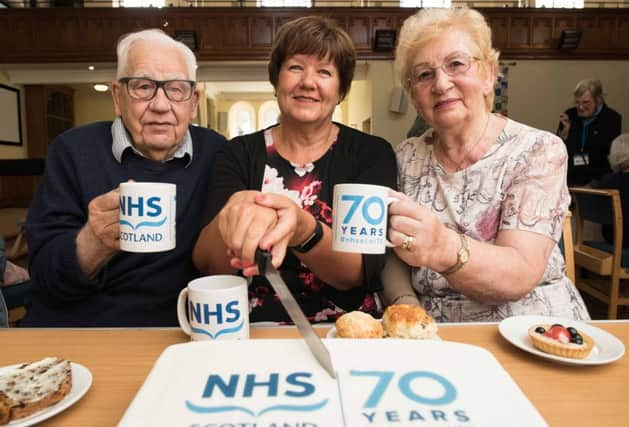NHS at 70: Ex-medical staff reflect on 70 years of National Health Service


Around 100 members of the NHS Retirement Fellowship, who worked across 15 Edinburgh hospitals from the 1950s, have gathered for their weekly coffee morning where they catch up with friends and former colleagues. This week, in honour of the 70th anniversary of the NHS, the members are welcoming a special guest, Scotland’s Chief Nursing Officer Fiona McQueen who chatted to the men and women who made up the backbone of our National Health Service.
She said: “I am immensely proud of the work of our nurses, midwives and other health professionals. They were, and remain, truly unique in their professionalism and dedication.”
Advertisement
Hide AdAdvertisement
Hide AdJaney Tulley from Dalkeith, started her career in 1960 and worked as a fever nurse, midwife and district nurse before hanging up her uniform in 2001. The 78-year-old said: “I saw nursing change a lot over the years, with new treatments and ways of working.
“I think the NHS is invaluable, it’s been a huge part of my life both personally and professionally. I loved being a nurse and still miss it to this day.”
After meeting Janey, whose grandmother, mother and six sisters were all nurses, Fiona added: “Hearing the experiences of those who worked for the NHS in its infancy demonstrates how far patient care has come as a result of innovation, investment and advances in treatment.
“The care and compassion displayed by those in the profession, however, has remained constant.”
Advertisement
Hide AdAdvertisement
Hide AdBill Grant, 90, got his first job at the Royal Infirmary when he was 18 years old and was working on the day the NHS came into being on June 5, 1948. The former pathology technician worked across hospitals in the city until he retired thirty years ago. He loved his work and thinks the NHS is “the very best thing”. He said: “The very fact you could get a doctor without having to pay for it was a revelation. It moved treatment from the kitchen table to a safe environment.
“I feel sorry that it’s under pressure but I’m hoping it’ll come through. Long may it last.”
Sandra Binnie, 75, worked as a nurse in the NHS and private healthcare for 51 years but it was while working for the public purse that she gained the most fulfilment. She said: “It was a privilege to work for the NHS. There is a good work ethic and you’re working with the people who need you most but the volume of work is high which meant that sometimes you couldn’t sit and hold patients’ hands when they most needed it.
“But the point of the service is that it is fair for all and it cannot be allowed to fail.”
Advertisement
Hide AdAdvertisement
Hide AdA mental health nurse for 39 years after moving to Edinburgh from Galway, Trisha Douglas trained at the Western General before working at the Royal Victoria Hospital and the Royal Edinburgh. She said: “The NHS is a part of the British way of life. It is embedded in its culture and one thing that people are proud of. People say it’s football but it’s the NHS”
Trisha, whose son is a doctor, added: “There has always been pressure on services but these days there are so many people and much more complex procedures.
“It takes a special person to work in nursing – it’s not just about theory. You need to be understanding and caring and able to identify with people’s worries. Treatment is about much more than just dealing with a cut on the hand.”
At the close of The Second World War, 19-year-old Margaret Johnstone left her hometown of Selkirk to train as a nurse after responding to an advert in the Evening News. After her studies, she took up a posts at Bangour Village Hospital, a psychiatric facility in West Lothian, and at the tuberculosis sanitorium in East Fortune before training as a community nurse with the Queen’s Nursing Institute in Edinburgh in 1956.
Advertisement
Hide AdAdvertisement
Hide AdAs a midwife, health visitor and district nurse, she drove around the Capital in a Morris Minor delivering babies and nursing patients in their homes before retiring in 1986. She told the Evening News that the advent of the new NHS “made a really positive impact. Patients and staff were on a much firmer footing and people with no money to spare could get treatment.”
Margaret, 92, estimates that she delivered thousands of babies in Edinburgh and the Lothians, even hopping on and off buses with a gas and air machine in her medical bag before she passed her driving test.
Expectant fathers would knock on her door at all hours to call her to their partner’s aid and she once delivered a baby in the back of a stationary ambulance. She remembers her time as a nurse fondly: “I loved my job. Helping people and knowing that we were so appreciated meant everything.
“Times have changed but the NHS saves lives, and has done since it started.”